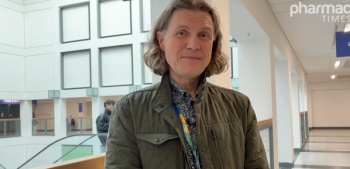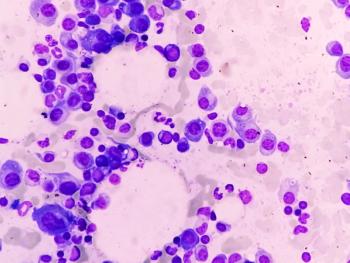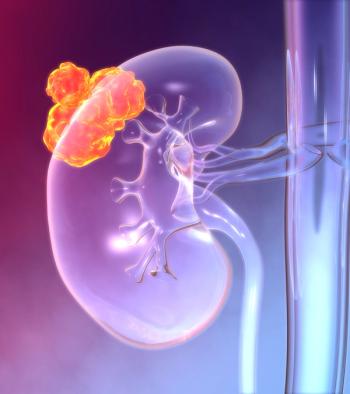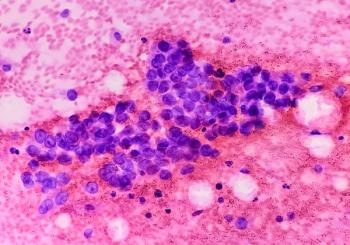
Oncologist Thor Halfdanarson reviews dose-finding data for the targeted α radioligand therapy [^212Pb]VMT- α-NET, highlighting manageable toxicity, stable renal function, and plans for phase 2 evaluation.

Oncologist Thor Halfdanarson reviews dose-finding data for the targeted α radioligand therapy [^212Pb]VMT- α-NET, highlighting manageable toxicity, stable renal function, and plans for phase 2 evaluation.

New data from the NATALEE trial reveals ribociclib significantly improves invasive disease-free survival in HR+/HER2– early breast cancer.

Adjuvant abemaciclib plus endocrine therapy significantly enhances overall survival in high-risk HR-positive HER2-negative breast cancer.

Durvalumab combined with FLOT shows significant survival benefits for patients with resectable gastroesophageal junction cancer, regardless of PD-L1 status.

Nivolumab plus chemotherapy and ipilimumab show significant long-term survival benefits for advanced esophageal squamous cell carcinoma.

Research reveals that statins and metformin enhance survival rates in early-stage triple-negative breast cancer, offering hope for affordable treatment options.

Gut microbiome research is no longer an obscure field in cancer care.

These therapies are being investigated in earlier lines, with several new treatments in development.

Shirish Gadgeel, MD, discusses an integrated analysis of the regional TRUST-I study and global TRUST-II study presented at the European Society for Medical Oncology Congress 2024.

The addition of high-dose vitamin D3 to standard treatment did not delay the progression of cancer compared with the standard dose of vitamin D3.

Ponsegromab displayed significant and robust increases in body weight at the completion of the study for all doses.

The CRAFT (NCT04551521) trial is still ongoing to assess findings in the remaining patient arms.

Patients with for HER2-positive breast cancer have an increased risk of developing brain tumors.

Pembrolizumab is an anti-programmed death receptor 1 (PD-1) therapy designed to increase the immune system’s ability to detect and fight tumor cells.

In 2 studies, durvalumab improved overall survival for those with unresectable hepatocellular carcinoma and event-free survival for muscle-invasive bladder cancer.

The treatment significantly reduced risk of occurrence by 25% compared with endocrine therapy alone.

Ten-year follow up data showed a sustained survival benefit with nivolumab-ipilimumab in advanced melanoma.

The trial demonstrated that the combination of lenvatinib, pembrolizumab, and transarterial chemoembolization (TACE) significantly improves progression-free survival and objective response rates compared to TACE alone.

The efficacy and safety profiles of CAR T-cell and bispecific antibody therapies have led to their investigation in earlier lines of therapy, with several new treatments in development.

Data from the second interim analysis of the DETECT V trial, presented at ESMO Congress 2024, suggest that a chemotherapy-free regimen combining dual HER2-targeted therapy with endocrine therapy, particularly with the addition of ribociclib, may be an effective treatment for patients.

Abstracts from the OrigAMI-1 and MARIPOSA-2 trials indicated the treatment benefits of amivantamab-vmjw and chemotherapy in multiple cancer indications.

At ESMO Congress 2024, Shuji Ogino, MD, PhD, MS, explained that the rising incidence of young-onset cancer may be due to generational risk factors such as lifestyle, diet, and environmental changes, emphasizing the need for long-term research and follow up to understand early-life influences on cancer development.

Overall survival results from the phase 3 KEYNOTE-522 study provide evidence of improved long-term outcomes from this pembrolizumab-based regimen.

Clinical research presented at ESMO 2024 highlights the significant survival benefits of perioperative and neoadjuvant immunotherapy with nivolumab and nivolumab plus ipilimumab, while emphasizing the role of biomarkers such as ctDNA and KRAS mutations in guiding treatment decisions.

An ESMO 2024 presentation explores the growing role of the gut microbiome in immunotherapy response, emerging diagnostic tools such as PCR chips, and innovative therapies such as fecal microbiota transplantation and microbiome-preserving strategies to improve patient outcomes.

The gut and intratumoral microbiota influence cancer development, progression, and treatment responses, highlighting the potential for treatment strategies that leverage these microbial interactions to enhance cancer therapies.

Disparities continue in younger patients, raising the need for novel interventions to mitigate challenges associated with younger age at diagnosis.

Viktor Grunwald, MD, PhD, discusses the post-hoc analysis of the phase 3 CLEAR trial investigating the combination treatment in the first-line setting for advanced renal cell carcinoma.

Compared to chemotherapy alone, amivantamab plus chemotherapy treatment with and without lazertinib had also demonstrated positive trends in OS and ORR in patients with NSCLC.

Compared to osimertinib alone, first-line treatment with amivantamab plus lazertinib was also shown to improve progression-free survival and have an increased duration of response.